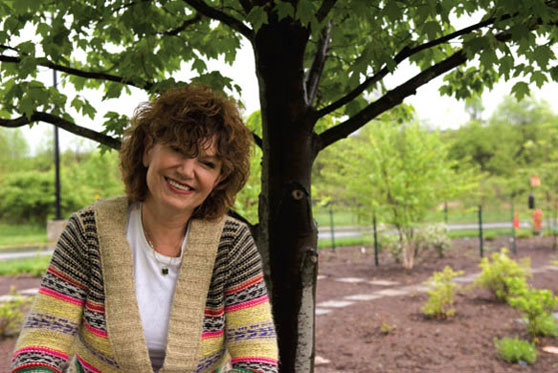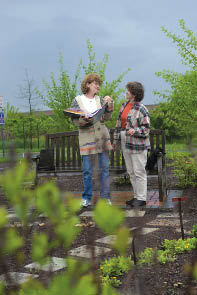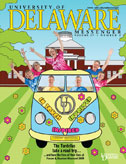New opportunities grow from challenges

ALUMNI | Two days before UD’s Ag Day 2009, Meg MacDonald gathered with other New Castle County Master Gardeners to map out their game plan for the big day. They would be selling Mother’s Day flower baskets, an annual tradition, and needed to organize the crews who would be assembling the baskets ahead of time.
MacDonald, who would be part of the Friday work crew, was looking forward to the long hours arranging herbs and flowering annuals into wicker baskets and then adorning them with bits of dried flower and decorative ribbon.
“Gardening is a Zen thing for me,” says MacDonald, AS ’77. “It’s very peaceful and it’s great for relieving stress.”

Clad in casual garb, with hair gathered in an appealingly messy topknot, MacDonald is quick with a smile. She doesn’t look like she’d have a care in the world. And her schedule doesn’t appear too stressful, either.
Retired from broadcast journalism at the age of 53, she devotes large chunks of the week to the Master Gardener program but also allots daytime hours for catching up with friends, gardening in her Wilmington back yard and strolling through a nearby park.
It sounds like a free and easy lifestyle, until you get an inkling of how much energy MacDonald expends doing the things that most of us take for granted. Like getting out of a chair without wondering if your legs are going to buckle. Walking down a hallway without stumbling. And having a conversation without having to watch the other person’s lips move.
Diagnosed with Meniere’s syndrome, an inner ear disorder, MacDonald lost hearing in her left ear in 1991. A year later, she lost hearing in her right ear. And her balance problems are severe, especially at night because her sense of balance depends on sight.
She doesn’t drive at night and has had to crawl up the front steps of her house if she returns after dark. She also experiences bouts of severe fatigue and says she has learned to pace herself accordingly.
“Before an event like Ag Day I’ll need to catch up on my sleep,” she says. “If I don’t sleep enough, I’m totally wiped out.”
MacDonald lives in a far different world than the one she flourished in as a news reporter in the ’70s and ’80s. Back than, this gregarious brunette was on the fast track and spent long hours on the job, even before graduating from UD.
She was a disc jockey on the campus radio station, throughout her senior year. One day, a visiting station manager from WILM in Wilmington liked what he heard. MacDonald started doing morning news reports on that all-news station even before graduation and from there landed a job as a reporter on WBOC-TV in Salisbury, Md.
By the time she was 23, she was at a Greensboro, N.C., TV station, writing, producing and appearing on the 6 p.m. and 11 p.m. news. At 25, she moved on to a station in Charlotte, N.C., and from there to WCAU in Philadelphia. MacDonald had made it to New York and was working on the syndicated news program American Journal when she lost hearing in her right ear.
Shortly afterward, she returned to WCAU and was able to appear on air thanks to her excellent lip-reading skills, which she says were honed from all those years of watching videotape at double speed during the production process.
She also wears a hearing aid and a cochlear implant, a surgically implanted electronic device that stimulates any auditory nerves that are still functioning inside the cochlea. Yet, despite these high-tech tools—the cochlear implant has been dubbed a bionic ear—and her lip-reading skills, MacDonald chose to leave WCAU after a few years.
“It was an exhausting process to file my reports,” she explains. “Even now, in everyday life, it’s tiring to read lips, and I can only do it for so long.”
MacDonald’s tone is matter-of-fact as she relays this information; not a shred of self-pity is evident. The only attitude adjustment she has needed to make, relative to her hearing loss and medical condition, is to start speaking up for herself when accommodations are necessary.
This fact became apparent when she enrolled in the Master Gardener training course, which is a rigorous program, acknowledges Carrie Murphy, the Extension horticulture agent who trains and oversees the Master Gardeners.
“At first, Meg was rather shy in expressing her needs,” Murphy recalls, “but as she spent more time with the Master Gardeners, she became welcomingly outspoken about her needs, such as asking others to use microphones, speak slowly and loudly, and look directly at her so she can read their lips.
“She always delivers these needs in a humorous way. She has a great sense of humor and wit about her.”
Not surprisingly, one of the first things MacDonald got involved in was the Master Gardeners’ publicity committee. She has used her industry knowledge and communication skills to significantly enhance the organization’s newsletter, Web site, brochures, pamphlets and community events.
But when MacDonald meets with the Master Gardeners she is, first and foremost, a fellow gardener. She says it’s her love of horticulture and desire to give back to the community that motivated her to join the group.
The 85-member volunteer group provides horticulture and environmental education in classroom, community and demonstration garden settings. In New Castle County alone, these volunteers contribute about 7,400 hours of service in a typical year.
“I wanted to become a part of a group that makes a real difference in the community,” MacDonald says.
Murphy says MacDonald brings a lot to the group as well.
“Meg is very much into native plants, and more than anything, I note that she is an environmentalist,” Murphy says. “Her gardening is reflective of this; she looks to tread lightly on the Earth, and to cultivate a natural environment.
“Meg brings a lot of energy, enthusiasm and wonderfully innovative ideas to the table.”
Article by Margo McDonough, AS ’86, ’95M





